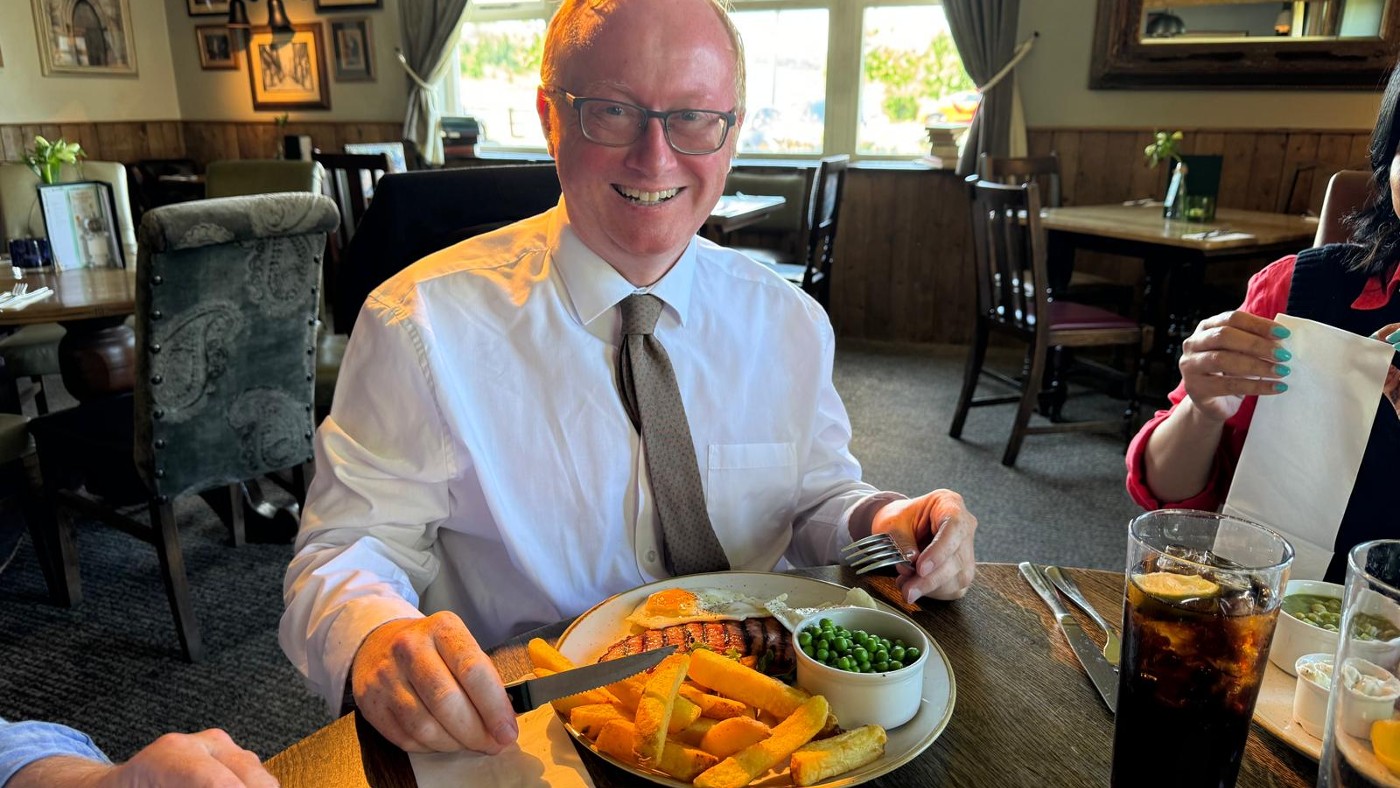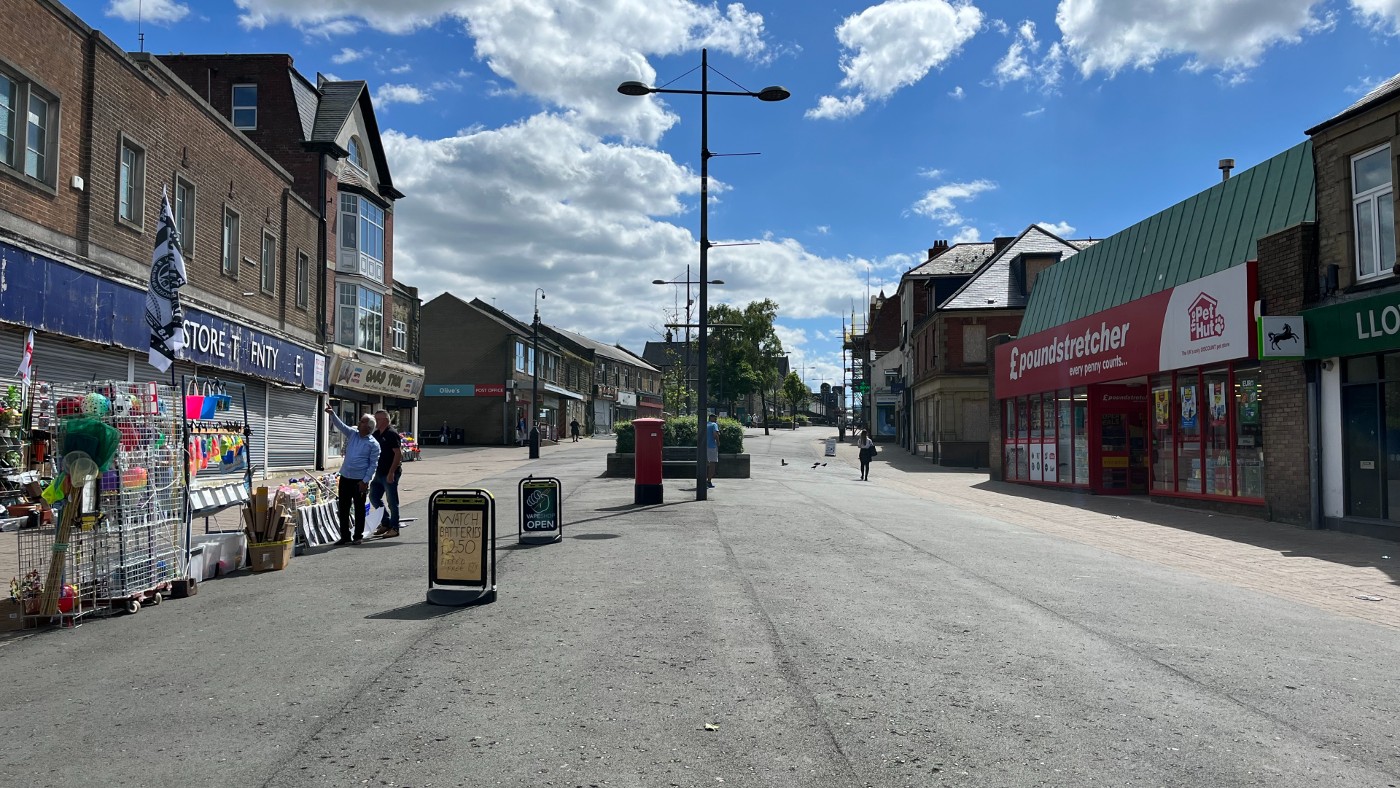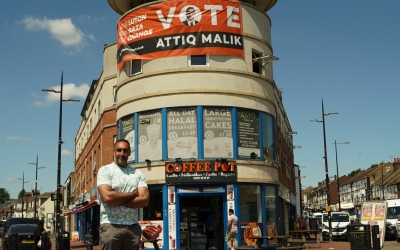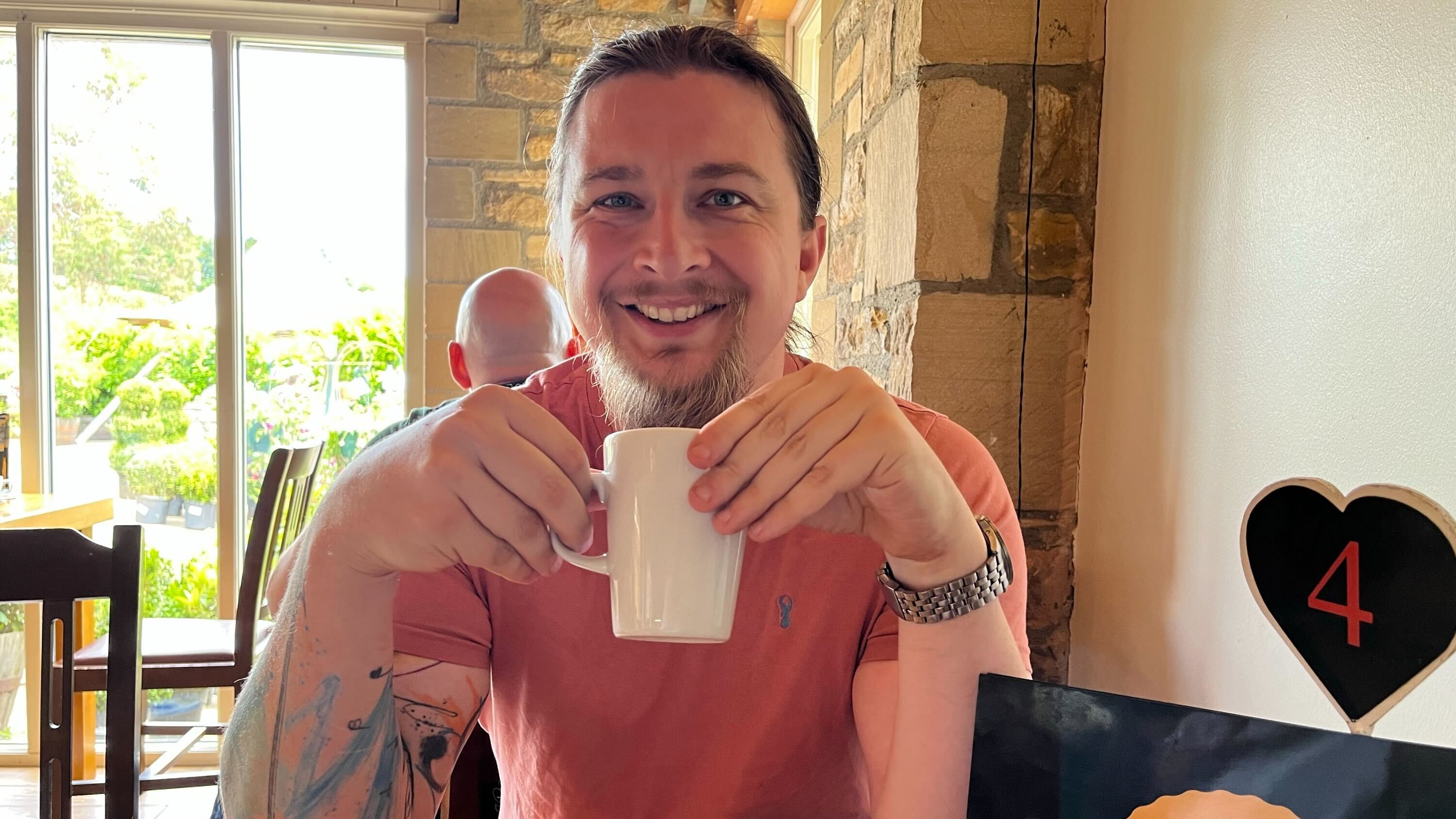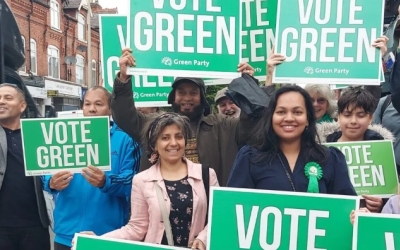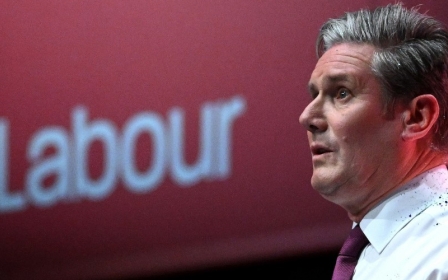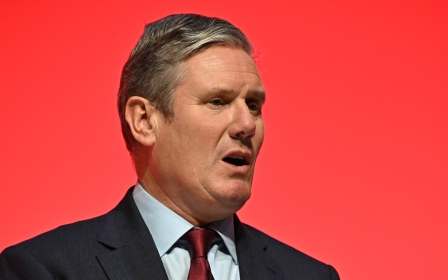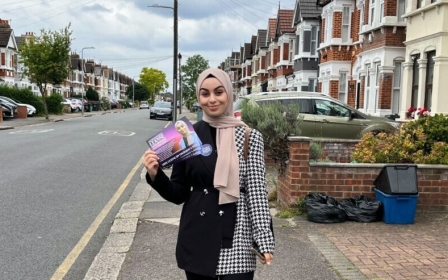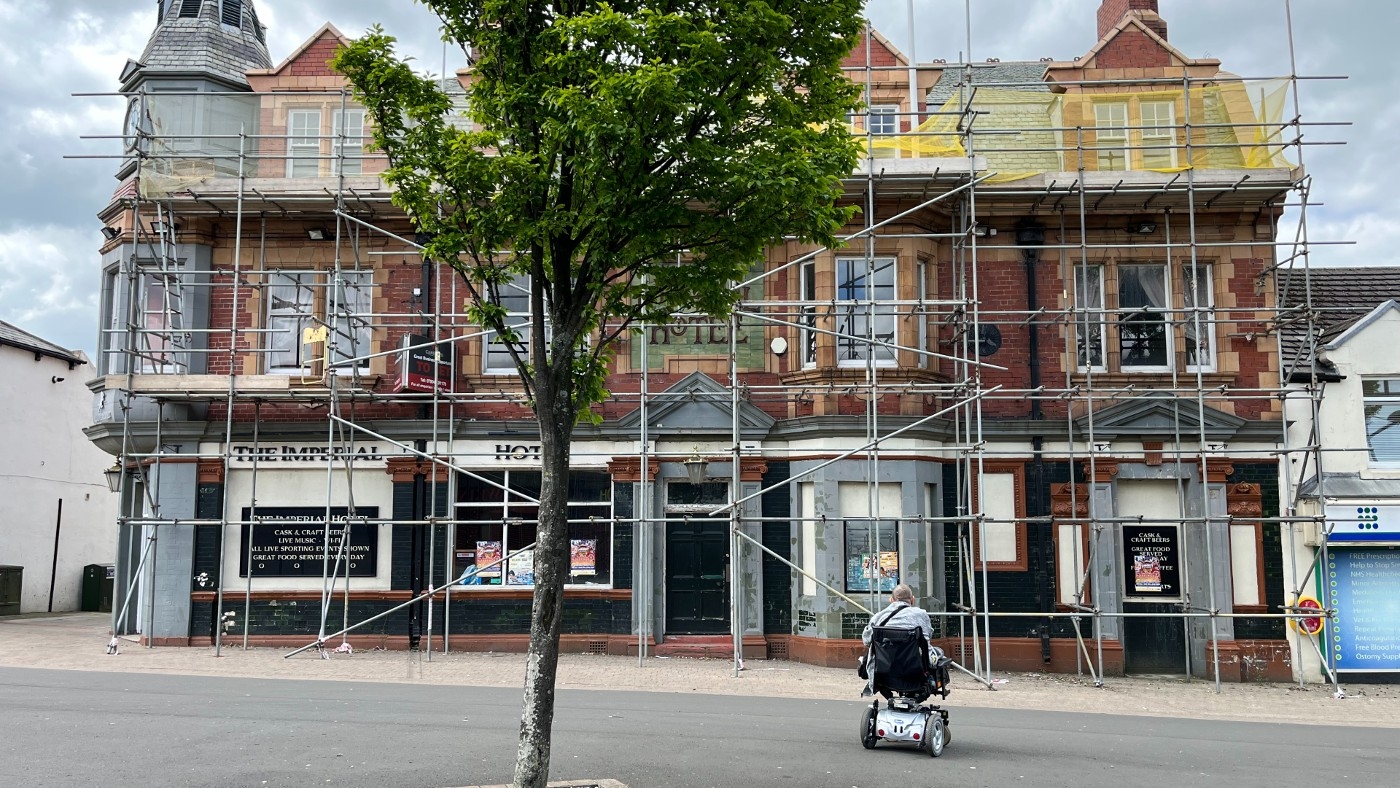
UK election 2024: Looking for Luke Akehurst in North Durham's left-behind towns
On a high street in the northeast of England, two men in their sixties, both called Alan, are talking about death, decline and Luke Akehurst.
“He supports Israel, doesn’t he?” one of the Alans, a former local council worker, says of the Labour Party candidate for North Durham. “That’s him out for me.”
“The Labour man, he’s from bloody Essex,” says the other Alan, who used to work as a mechanic. “Someone told me he’ll stand anywhere if it means he gets in.”
In fact, Akehurst, aged 52, grew up in Kent, another county adjoining London. But in Stanley, a former coal mining town in County Durham, that hardly matters.
Akehurst, who lives in Oxford and was a Labour councillor in Hackney, east London, is a southerner who had not set foot in the constituency of North Durham before becoming - as part of a process overseen by Labour’s National Executive Committee (NEC), a body on which he sits - its prospective MP.
New MEE newsletter: Jerusalem Dispatch
Sign up to get the latest insights and analysis on Israel-Palestine, alongside Turkey Unpacked and other MEE newsletters
While many of the people who speak to Middle East Eye in North Durham are only dimly aware of who Akehurst is, his arrival in the northeast has caused huge controversy in the local Labour Party and confirmed a feeling held by many locals that their lives and problems are of no real import to the political class based in London.
On Monday, Sam McMahon, a Labour councillor in North Durham, a safe Labour seat that its new candidate from the south is expected to hold, confirmed that he had resigned from the party. In a statement, he said he had made the decision after the NEC “chose to parachute” Akehurst in as the Labour candidate.
Describing the former Hackney councillor as someone with “no connection to North Durham” who had been “forced upon us by Labour HQ”, McMahon said had had met Akehurst for the first time at a meeting with other local Labour members.
“I did not find his answers to my questions about why he was parachuted in by the national party, nor his controversial stance on the situation in Israel-Palestine, to be satisfactory,” McMahon said, announcing his resignation.
Another local councillor, Angela Hanson, has also quit Labour in protest. “He has been a lobbyist for Israel for a number of years and has some appalling views about Palestine.”
Who is Luke Akehurst?
Those views on Palestine are no secret. Akehurst has branded the UN antisemitic on X, formerly Twitter, for being “very biased” against Israel, and said that Amnesty International and Human Rights Watch are also “incredibly biased against Israel”. He has expressed support for Israeli settlements.
The Labour candidate, who is not Jewish, has said that Marxist Jews have “abandoned very much of their Jewish identity”, seeing Judaism as “a purely cultural thing around a bowl of chicken soup”. In one of at least 2,000 tweets deleted just before his selection was announced, Akehurst said that Sky News footage showing Palestinians wounded in an Israeli attack on Gaza’s al-Shifa hospital was staged by a “Hamas actor”.
A Labour party activist associated with what he calls the “moderate” wing of the party (his blog contains “subtitles for the hard left”), Akehurst, a staunch supporter of Keir Starmer, has been the director of the pro-Israel group We Believe in Israel since it was established in 2011.
“It was almost my dream job to run a pro-Israel campaigning organisation,” he told the Jewish Telegraph in 2014, who described him as coming from a non-Jewish family with a “long tradition of sympathy with Israel”.
“By the time I was involved in the Labour Party from the age of 16, I already knew I was supportive of Israel,” he said. With We Believe in Israel, Akehurst described travelling to events with Israeli embassy diplomats and senior figures from the Board of Deputies of British Jews, drumming up support for Israel.
He said he lobbied David Cameron’s government to “put pressure on the Palestinians to clamp down on hate education” and “created a network of pro-Israel councillors in local government”, partly because the boycotting of Israeli goods is raised at local level and partly because he saw how important it was to influence politicians at the start of their careers.
Described by former Israeli embassy official Shai Masot as a "great friend", a "great campaigner" and “one of the best inside” the Labour Party, Akehurst has even brought comrades from the world of pro-Israel lobbying up to Durham with him.
Michael Rubin, who lives in London and is director of Labour Friends of Israel (LFI), has been photographed canvassing for Akehurst in the northeast, as has Kira Lewis, who works for the Britain Israel Communications and Research Centre (Bicom), out of which We Believe in Israel grew.
A Labour Party official in North Durham did not respond to Middle East Eye’s request for an interview with Akehurst or with anyone campaigning for him.
“I’m not a local candidate,” Akehurst told the Local Democracy Reporting Service, “but I’ve got a lot of political experience. I’m like a sponge, I’m absorbing and learning exceptionally fast. I’m like a new signing to the Labour North team.”
'Waiting for our funerals'
Labour’s new signing has proved elusive, skipping local hustings after his campaign launch was ambushed by pro-Palestine activists. He posts photos of himself eating large meals in pubs and out holding up campaign signs.
Back in Stanley, no one has encountered Akehurst. The air is heavy. It is unusually hot. “We’re just waiting for our funerals,” one of the Alans, the former local authority worker, says. He speaks of decades of decline in the region and points to a plastic bag full of jigsaws. “This is what I do now.”
“They couldn’t live the way we do,” the other Alan says of politicians in London. “They couldn’t live on the wages people have round here. They don’t have any idea how we live.”
Earlier in the week, a man had been stabbed just a few metres from where the two men are sitting, on a bench in the middle of the high street in Stanley, which has a population of about 20,000. As is the case in the centre of so many towns across the UK, the signs of neglect here are clear.
The Imperial Hotel, with its baroque-style front, built in 1905, is closed and covered in scaffolding. Among the betting shops and the pound stores, a working men’s club - full of punters in the middle of a Monday afternoon - still stands.
Both Alans tell Middle East Eye their fathers were miners. The industry gave Stanley and much of County Durham and the northeast an identity and way of life - as well as putting money in the pockets of the men who risked their lives underground.
But Margaret Thatcher’s government went to war on the coal miners, the unions that represented them and the broader working class, socialist movement they represented. The last mines in County Durham shut in 1993, the same year the Swan Hunter shipyard at Wallsend was closed.
The northeast, dominated for so long by mining, shipbuilding and steelmaking, was changed forever, as successive governments did little or nothing to help local communities fill the void. Into this void of chronic unemployment crept addiction, depression and anger, sometimes buried, sometimes not.
'What does he know about the north of England? Why couldn’t it have been one of the councillors from up here?'
- Beryl, North Durham resident
“There was a steel works at Consett, pits and factories,” says Helen, who came to Stanley in 1966 as a teenager from Ireland with her husband, who was from area. She remembers big stores on the high street, people and activity, life.
“The Labour one is from Cambridge isn’t he,” says Beryl, sitting next to Helen. “Well it’s the same,” she says on hearing it’s actually Oxford. “What does he know about the north of England? Why couldn’t it have been one of the councillors from up here?”
“The wealth is certainly not fairly distributed,” Beryl says, as she talks about the country’s regional inequality. “The north has been neglected for far too long. Labour and Tory: they’ve both neglected it. The Tories because we don’t vote for them and Labour because we always vote for them.”
Ann, making up a trio, complains about immigrants. She’s thinking of voting for Reform UK - “for Farage”. “Oh, he’s an arsehole too,” replies Helen. “Why do we want people coming here when there’s no jobs for us,” Ann asks. Helen, her accent now a blend of her native Ireland and the English northeast, says the Turkish barbers work very hard. “Would a local run it for seven days a week?”
That Turkish barber shop is on the high street and is called Classy Lads. It’s owned by an Iraqi and staffed by Syrians, a 23-year-old called Mo and a 19-year-old, also called Mo. One of them has been in the UK for eight years, one for four. “It’s boring,” the latter Mo says. Both say they have not experienced much racism, but that it is worse for Muslim girls and women who wear the hijab.
“All of them are angry,” the 19-year-old Mo says of the people of Stanley. “They’re just moody.” He lives in a council house with his parents and wants to get a job in Saudi Arabia. “It’s about work, money, building your future.”
The opposition
A few miles away, eating a ham and cheese toastie at the Tea Barn, a bustling cafe full of retired people fresh from shopping at the Pity Me garden centre, Green Party candidate Sunny Moon-Schott has a more local vision for the future.
Moon-Schott, 33, has long hair and a goatee beard. He’s a trained nuclear physicist who worked briefly on Britain’s Trident programme, which he now believes should be scrapped. A parish councillor in the small village of Shincliffe, Moon-Schott worked in the council’s Children and Young People's Services and has seen first-hand what life is like in North Durham, where 31 percent of children live in poverty.
“In the sixth wealthiest country, that kind of statistic is morally reprehensible,” he says, pointing to the two-child benefits limit and to the bedroom tax as two major causes. “People are hampered at every turn. There is profound waste built into a system.”
Moon-Schott talks about the area’s oversubscribed shelters for abused people, saying that stalking is a particular problem. He says the sharp reduction in the number of communal spaces has adversely affected the way people relate to each other. This is also connected to transport: since 2010, 40 percent of bus services in terms of mileage in the northeast have been cut, with the equivalent figure in London just five percent.
“The old pit villages here have become areas people pass through in cars,” Moon-Schott says. “There’s nowhere for people to stop and there’s fewer and fewer buses. A lot of people retire to these small villages and end up isolated because they can’t drive.”
The Green candidate compares the level of resources and coverage his party gets to that of Reform UK, with Nigel Farage enjoying plentiful media attention and regularly courting controversy.
“With very limited resources, it’s very difficult for our message to cut through,” Moon-Schott says. “I work full-time. I’m just a guy that lives in North Durham that wants his neighbourhood to be a kinder, cleaner, fairer, more vibrant place to live.”
Moon-Schott is one of a number of candidates, including Chris Bradburn of George Galloway’s Workers Party of Britain and Craig Martin of the Liberal Democrats, to have criticised Akehurst's arrival in North Durham.
Martin, a local councillor for North Lodge near Chester-le-Street, got out his old map of County Durham and offered to give Akehurst a guided tour
“The ultimate aim is to show Labour they can’t take local votes for granted,” Moon-Schott says. But given the alternatives available, the vote against Labour will be split.
'Life is shite here'
Just a short train ride from Newcastle, the northeast’s largest city and historic centre, Chester le-Street is North Durham’s main town, famous for its international cricket ground and its 19th century viaduct. In the market town’s main square, locals voiced similar grievances to the ones heard in Stanley.
“Life is shite here,” says one 18-year-old boy. “It’s a shite place.” He was one of a group of lads and two girls hanging around a pair of benches close to the bus stop. Half of them didn’t know about the election. “Politics happens down south,” the 18-year-old says. “Rishi Sunak needs to get on,” another boy, who is about to train to be a plumber, adds.
The group say there’s nothing for them to do. One 16-year-old points to a new dessert place called Lush, which opened about a year ago opposite the bus stop. “That’s the best thing that’s happened here in a long time,” he says.
Talking about the history of mining and socialism in the area, one of the group says: “It doesn’t really mean anything anymore. It’s something our ancestors did.”
Caroline, a middle-aged mother, says she’s always supported Labour and that she’ll vote for them again. “Hopefully they’ll stick to what they’re saying: more teachers, more police, sort the NHS out,” she says. “There’s nothing around here for children. No community stuff for teenagers.”
“I don’t really vote. They promise the world and they don’t do anything,” says Alan, a well-built man sitting next to her. He says that if he did vote for anybody, he’d vote for the Green Party. “They’re more for the people.”
Both Alan and Caroline think Brexit has “destroyed the country” and both talk about an epidemic of mental health problems in the area, including depression and psychosis. Caroline says her 26-year-old son, who self-harms, has been helped by a local Green councillor.
'I don’t really vote. They promise the world and they don’t do anything'
- Alan, North Durham resident
Sitting at a table outside independent cafe Coffee Bank, in the scorching heat, James and Lauren, a young couple of five years, are voting for different parties.
James lives just a few streets away, and for five years he and some of his neighbours have been trying to do something about an outdoor staircase that is regularly covered in rubbish and used as a drug dealing spot. The police, the council and Morrisons, the supermarket the staircase leads to, have all passed the responsibility to each other and nothing has changed.
Both James and Lauren refer to Akehurst as having been “parachuted” into the area. James doesn’t care about his commitment to Israel. “I would much prefer people to care about local politics,” he says. “If you’re not from the area you will never understand the problems we have. You won’t have seen the change… The Tories, Labour: they’re one and the same.”
Lauren joined the Labour Party when she was a teenager, when Corbyn became leader. She’s older now and feels disenfranchised. “I believed, perhaps naively, that Labour would have made a difference,” she says. “I don’t believe a word that comes out of Starmer’s mouth. I still don’t like him.”
Lauren stops to consider her options. The number eight bus, which winds its way to Sunderland, 12 miles away on the North Sea coast, pulls up. With the day stretching out long and formless ahead of them, the teenage boys file on.
Middle East Eye delivers independent and unrivalled coverage and analysis of the Middle East, North Africa and beyond. To learn more about republishing this content and the associated fees, please fill out this form. More about MEE can be found here.


